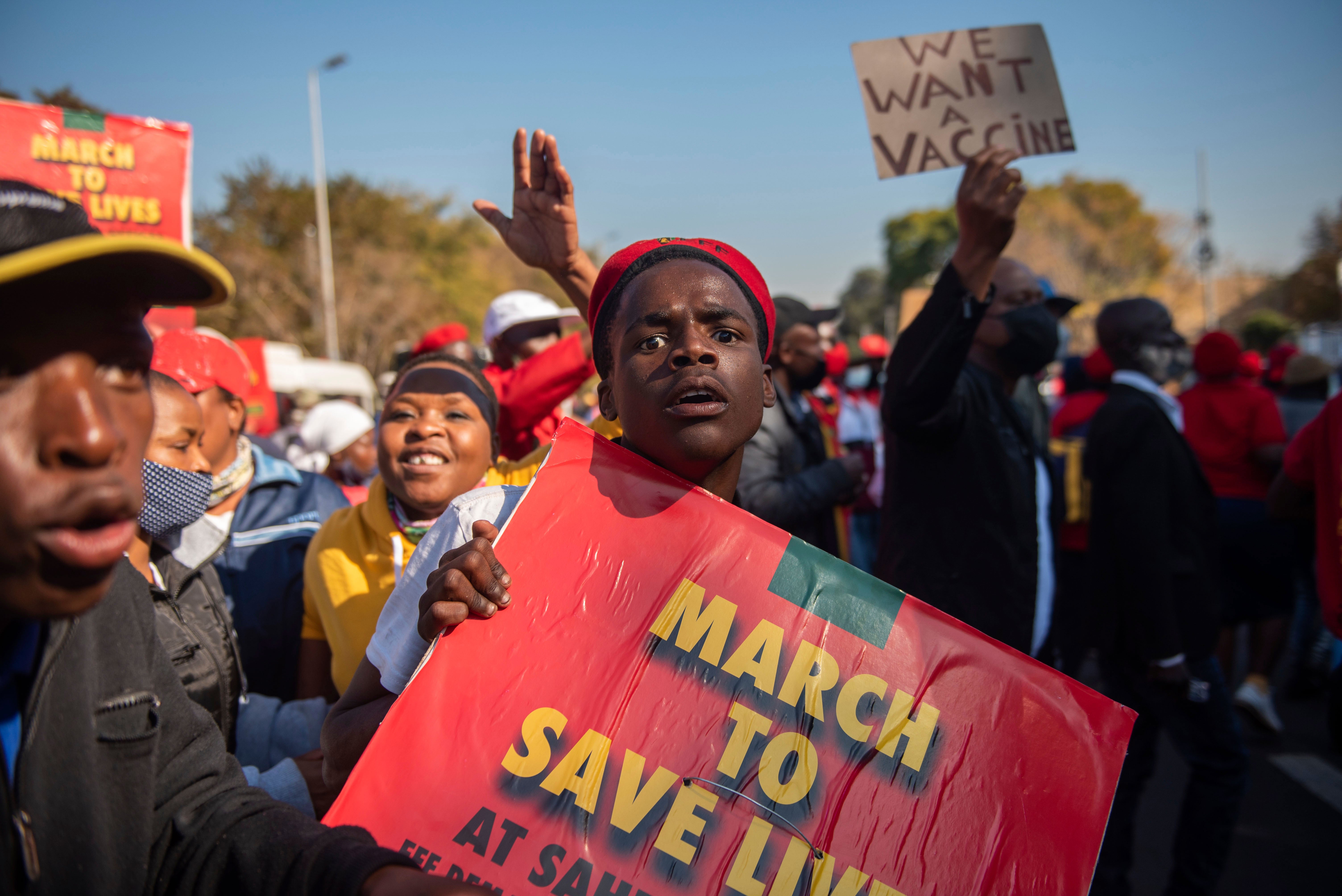South Africa battles rapid rise of COVID-19 in Johannesburg
A rapid resurgence of COVID-19 is slamming South Africa’s largest city, Johannesburg, and threatens to overwhelm its hospitals

Your support helps us to tell the story
From reproductive rights to climate change to Big Tech, The Independent is on the ground when the story is developing. Whether it's investigating the financials of Elon Musk's pro-Trump PAC or producing our latest documentary, 'The A Word', which shines a light on the American women fighting for reproductive rights, we know how important it is to parse out the facts from the messaging.
At such a critical moment in US history, we need reporters on the ground. Your donation allows us to keep sending journalists to speak to both sides of the story.
The Independent is trusted by Americans across the entire political spectrum. And unlike many other quality news outlets, we choose not to lock Americans out of our reporting and analysis with paywalls. We believe quality journalism should be available to everyone, paid for by those who can afford it.
Your support makes all the difference.A rapid resurgence of COVID-19 is slamming South Africa s largest city, Johannesburg and threatens to overwhelm its hospitals.
Johannesburg, a city of 5 million, and the surrounding Gauteng province account for about 60% of the country’s new daily infections. South Africa’s 7-day rolling average of daily new cases has doubled over the past two weeks from 10 new cases per 100,000 people on June 10 to 22 per 100,000 people on June 24, according to Johns Hopkins University
South Africa's rising cases are part of a rampant resurgence across Africa whose peak is expected to exceed that of earlier waves as the continent's 54 countries struggle to vaccinate even a small percentage of their populations.
The steep rise of cases in Gauteng has not yet reached its peak, bringing authorities to consider increased restrictions on public gatherings and liquor sales. South Africa's vaccination drive has had a slow start and to date about 2.5 million people of the country's population of 60 million have received at least one jab.
The military has sent medical personnel to help treat the growing number of patients. Hospitals in Gauteng province are so full that many patients are being sent to medical facilities hours away in Mpumalanga and North West provinces, Lucky Mpeko, a director at QRS ambulance services, told The Associated Press.
“The normal practice is that a patient must be taken to the closest hospital to their home, but that has not been possible because hospitals are full, they do not have beds," said Mpeko.
“Even when you are allowed to bring a patient to a hospital, you will have queue (wait in line) for two or three hours while they try to find space for your patient,” said Mpeko.
He said under normal circumstances, taxis take 30 to 45 minutes to transport a patient to a hospital, but now the time is often hours because they must drive such long distances.
The beta variant, first identified in South Africa, continues to dominate here. The alpha and delta variants are also here, but they are responsible for a minority of cases, according to health experts.
This week health faculty at the University of the Witwatersrand in Johannesburg demonstrated against the government's management of the crisis and called on authorities to urgently reopen Charlotte Maxeke Hospital in Johannesburg, a designated COVID-19 center. Some parts of the hospital were gutted by a fire in April and more than 700 patients were evacuated. Initially, officials said the hospital would be reopened within two weeks, but two months later it's still closed.
“It is having a huge impact. We are talking about a 1,000-bed hospital being closed in the middle of a pandemic, with a wave that is not comparable to the ones we previously had," said Professor Johnny Mahlangu, head of Wits university's pathology school and who participated in the protests.
“This hospital has been declared as a COVID-19 treating facility and it is missing in action and that is negatively affecting us," he said. “The province is currently under siege from the pandemic and opening this facility will help us manage it.”
On Friday, the opposition Economic Freedom Fighters, protested in the capital, Pretoria, against the slow pace of vaccinations.
South Africa's sluggish rate of vaccinations is blamed for contributing to the new surge. It has now vaccinated just over 2.4 million people of its population of 60 million. The country has had a shortage of vaccines, among other delays.
On Thursday acting health minister Mamoloko Kubayi-Ngubane announced South Africa will soon include people aged 50 years and older as eligible to get vaccinated as the country seeks to expand its inoculations. So far vaccinations have been limited to health care workers, people aged 60 and over, and schoolteachers.
This week, 300 000 doses of the Johnson & Johnson vaccine were allocated to start vaccinating teachers and other workers in the education sector.